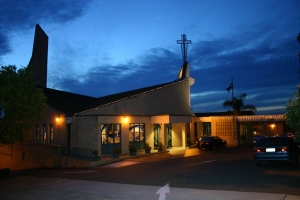 On the 24 November, 1999, on a drizzly Wednesday evening, I was baptised in a parish in the north-western suburbs of Sydney. Heralding from a family of Buddhist and Taoist heritage, I entered the Church at the age of twenty, gathered with a priest, sponsor, fellow catechumens and a mixed group of close friends, mostly of no religious background. A small but powerful group had accompanied me through the process of initiation and I was fully conscious and grateful for the fact that in God and this community I had been granted something which I would spend the rest of my life learning to be faithful to, learning to enter into, learning to trust.
On the 24 November, 1999, on a drizzly Wednesday evening, I was baptised in a parish in the north-western suburbs of Sydney. Heralding from a family of Buddhist and Taoist heritage, I entered the Church at the age of twenty, gathered with a priest, sponsor, fellow catechumens and a mixed group of close friends, mostly of no religious background. A small but powerful group had accompanied me through the process of initiation and I was fully conscious and grateful for the fact that in God and this community I had been granted something which I would spend the rest of my life learning to be faithful to, learning to enter into, learning to trust.
If a history of that parish were to be taken that date in November would not have stood out for any special recognition. I am sure it was for the most part an ordinary and customary year. However, beneath the everyday rhythm of this local parish it was for me a time of great consequence, of vital, spiritual breakthrough into the life of God to discover Christ as the total meaning of my life.
I share this to affirm that amidst the unfussy pews of the parishes we know and love the grace of Christ continues to move and mould hearts to his own. The local parish, even in its ordinariness, remains a privileged location of God’s transforming grace in the world.
However, as we take a wider view of the Australian parish we must admit that the possibility of personal spiritual breakthrough is not the same thing as the frequency of its happening.
This would be suggested by the challenges faced by our communities today, well known and rehearsed – declining weekly Mass attendance, now at a “critical moment” and leaning toward single digits across the nation; an ageing profile; the critical and chastening scrutiny of a Royal Commission; low morale in some quarters; low religious literacy among some of those we encounter; the pain of structural change and amalgamations directing energies inwards; and the by-product of diocesan decline, increasing managerialism within the culture of the Church that pulls towards the bureaucratisation of pastoral care.[1]
The Church in Australia can no longer rely on a ‘conveyer belt’ which was presumed to take Catholics from the cradle to the grave in faith, the assumption that a Catholic baptism and the mere fact of going to a Catholic school, for example, would secure a lifetime of committed discipleship. Historical circumstance and cultural momentum will no longer carry the Australian parish.
A new imagination is called forth and is demanded by the mission we have received, to make disciples and apostles of the baptised and the unbaptised, to be a leaven in the world as the sign and reality of the new freedom given in Jesus Christ. The flourishing of personal discipleship and apostolic outreach must become the motivating norm for our Church. For this to become a reality we are called to become more open and responsive to what God passionately desires to do through our parishes.
The Problematic
 Reflecting on the Australian Church, I would concur that the central challenge for parish life is this: we are caught between a call and desire for renewal and the weight of our own church culture towards maintaining the status quo. In this moment which cries out for new apostolic zeal, we can feel bound by layers of expectation that demand the continuation of the old even while new forms of parish life and mission long for expression.[2]
Reflecting on the Australian Church, I would concur that the central challenge for parish life is this: we are caught between a call and desire for renewal and the weight of our own church culture towards maintaining the status quo. In this moment which cries out for new apostolic zeal, we can feel bound by layers of expectation that demand the continuation of the old even while new forms of parish life and mission long for expression.[2]
How do we address the culture of a local parish that may desire change but does not want to change, that desires to grow, be joyful and bear new fruit but contains within it organisational antibodies that tend to kill anything that is new? How do we move our communities towards radical, fervent outreach when a ‘convoy routine’ permits spiritual progress or cultural change only at the speed of the slowest ship? As intimated by Pope Francis, the insistence that “we have always done it this way” – less often said than expressed in passive resistance – reveals a complacency at odds with the urgency of disciple-making which has been tasked to this generation.[3]
What are the levers or the strategies of prophetic witness that can lead us into that future which God invites, that can embolden us to ‘step into’ this future that has not yet fully arrived? The future of the Australian parish and its redemptive mission in the world are tied up with the preparedness of our local communities to take a conscious step towards their own conversion.
The Need of Vision
Such a cultural shift within our parishes demands that we reclaim the ‘why’ of our existence as local communities of faith. While talk of parish evangelisation often leaps to the ‘what’ – to programs, tools and techniques, reflective perhaps of our hardy Australian pragmatism – the ‘why’ or rationale of our parishes cannot be taken for granted.
On the ground, we appreciate the significance of the ‘why’ for our people when they receive the sacraments, those of initiation and besides. We earnestly want their ‘why’ to be Jesus, not merely school enrolment or unthinking convention. We understand the difference this ‘why’ makes to their likely future participation in the life of faith and the Church. We know that this ‘why’ distinguishes the disciple from the ‘what’ of the consumer who arrives asking ‘what do I get here’ rather than ‘who am I called to be here’. If we seek to grow our parishes for mission, we need to clarify and communicate the ‘why’ of our total parish life and this is called vision.
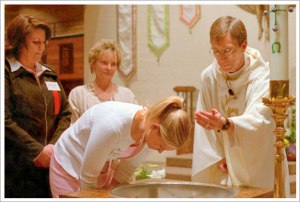 Fundamentally we are called to be a Church of the Great Commission. This is our vision, the ‘northern star’ guiding our resolve. “Go therefore and make disciples of all nations, baptising them in the name of the Father and of the Son and of the Holy Spirit, and teaching them to obey everything that I have commanded you” (Matt. 28:19). As it has been pointed out, in our Catholic Church we have certainly learnt to “go” and can claim a presence at all corners of the earth. We “baptise” and confirm relentlessly. We “teach” and catechise great numbers in our schools and sacramental programs. However, our ability as Church to “make disciples” remains in question, as raised by the pastoral realities for the Australian Church we have explored.[4] A local parish vision that reclaims the Great Commission as our primary calling clarifies the purpose of our community and makes it possible for others to become a part of that purpose.
Fundamentally we are called to be a Church of the Great Commission. This is our vision, the ‘northern star’ guiding our resolve. “Go therefore and make disciples of all nations, baptising them in the name of the Father and of the Son and of the Holy Spirit, and teaching them to obey everything that I have commanded you” (Matt. 28:19). As it has been pointed out, in our Catholic Church we have certainly learnt to “go” and can claim a presence at all corners of the earth. We “baptise” and confirm relentlessly. We “teach” and catechise great numbers in our schools and sacramental programs. However, our ability as Church to “make disciples” remains in question, as raised by the pastoral realities for the Australian Church we have explored.[4] A local parish vision that reclaims the Great Commission as our primary calling clarifies the purpose of our community and makes it possible for others to become a part of that purpose.
It is worth noting that a parish vision for the making of disciples and of ongoing apostolic support for the laity can arise from our hopes as well as our laments. Our restlessness and frustrations too can be helpful signs pointing us beyond what we have in hand, acting as a mirror image of our deepest desires for our community. When a bold vision of spiritual vitality is discerned it supplies the energy and constant challenge to the ethos and practices of a parish as it journeys toward that goal.
Within our Catholic culture, some voices express resistance to the need of an articulate vision and pastoral planning for our parishes and dioceses on the basis that this is a bureaucratic exercise, more at home in the Business Review Weekly than in our Church. Others oppose talk of setting a ‘vision’ for our communities on the basis that it second-guesses the providence of God whose Spirit indeed leads where it will.
As a community of faith we certainly do not have a road map or certainty for our future, a future that belongs to God. However, we do have a story of the kind of people, the kind of disciples, and the kind of communities we want to be as we make our journey towards that unknown future.
 When we communicate a vision of the parish, how we seek to respond to God in this context, in this time, in this local community, when we can articulate a vision of the kinds of spiritual growth we are seeking to raise up in our people, this passionate purpose becomes the heartbeat or pulse of a parish. Conveniently, and not incidentally, a renewed vision provides the case for change.
When we communicate a vision of the parish, how we seek to respond to God in this context, in this time, in this local community, when we can articulate a vision of the kinds of spiritual growth we are seeking to raise up in our people, this passionate purpose becomes the heartbeat or pulse of a parish. Conveniently, and not incidentally, a renewed vision provides the case for change.
The alternative to a parish communicating vision is a community standing in the silence of an unquestioned routine. The lifeblood of the parish might occasionally receive a boost or uptick through the initiative of individuals or the occasional event but without a sustained vision to consistently stimulate a higher life, the pulse of the parish inevitably slows and returns to maintenance, to the pace of survival rather than growth.
While no substitute for the parish, it must be acknowledged that the ecclesial movements in their charisms and narratives of holiness have shown us the power of a story to tell, as do the saints, those ‘bright patterns of holiness’ who image or supply a vision for the divine touching human lives.
I would like to suggest that in establishing its vision and promoting cultural change, a parish can gain much from imagining or visualising itself ten times better rather than only ten per cent better. This is because a small goal will tend to lead us to incremental changes that are based upon the existing rhythm, resources, programs and assumptions of the parish, leading to only slow or grinding progress.[5] Aiming for the sky, however, forces us to question our community assumptions and the fruit of our present culture, sheds bold and even new light on the taken-for-granted details of the everyday. Jesus’ vision of the Kingdom was so grand that it cast fresh light on who could eat at table. It was so immense that it gave meaning to tiny seeds. It was so extravagant it could sustain meaning in a Gethsemane night, even on the Cross.
It is no accident that the missionary determination of Pope Francis in The Joy of the Gospel begins with a grand dream, by looking out, not looking down.[6] In any case, if we do not cast a vision for our parishes, the question will inevitably rise from the pews, ‘Are we going anywhere?’
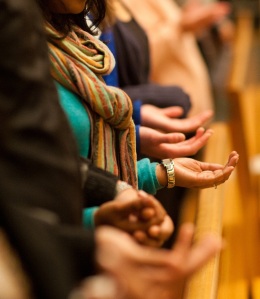 It is worth noting that when a parish makes a commitment to a clear vision of personal discipleship and spiritual community, presenting this before its people, other good things begin to flow. With a vision pointing the parish beyond its own concerns and circumstance, the parish can begin to move from a culture that engages people to build up the Church to become a Church that builds up people.
It is worth noting that when a parish makes a commitment to a clear vision of personal discipleship and spiritual community, presenting this before its people, other good things begin to flow. With a vision pointing the parish beyond its own concerns and circumstance, the parish can begin to move from a culture that engages people to build up the Church to become a Church that builds up people.
When we routinely engage people to build up the Church, the focus inevitably falls on maintenance and functionalism. A parish calls people forward to maintain its own life, its ministries, functions and tasks for which there is never enough human labour. We engage people, in other words, to ‘fill the gaps’ and out of a mindset of deficiency, with the best of our energy, dedication and resources flowing into the upkeep of our established groups, ministries and schedules. However, our parishes are not called to be factories, to keep the cogs turning over at any cost.
We cannot confuse our means with our end which is the abundant spiritual life of our people. As it has been said, ‘if you build the Church, you rarely get disciples. If you make disciples, you always get the Church.’ Parishes begin to change their culture towards mission when all forms of its preaching shift from a focus on what it wants from people to what it wants for them.
When a community understands itself as existing not for its own preservation but for the spiritual and personal change of its members and non-members, then all that the parish undertakes, its programs, groups, structures, and finance, will be seen and considered in the light of its mission to make disciples. We will begin to measure our life not by the standards of conservation – the managing of internal concerns, the parish patrimony, nest egg or tranquillity – but by the standards of our outwards mission. We will begin to gauge our life not only by our seating capacity but also by our sending capacity, and the extent of the spiritual fruit and personal change we nurture into life.
Increase over Addition
In reflecting on the Church’s living tradition and the experience and best practices of growing Catholic communities, I would like to suggest four elements as being integral to the renewal of parish culture toward deeper discipleship and wider evangelisation.
In sharing these suggestions, I am mindful that when a community or group has a vision but no strategy to achieve it, it will tend to simply add on new programs and activities to an already busy routine hoping this will affect a difference. Yet we know, even implicitly, that addition is not synonymous with increase, that ‘more’ is not always tantamount to ‘better’.
Indeed, we are learning on a national, diocesan and parish level that a “spaghetti” approach to Church life, over-programmed with a splattering of disconnected activity, tends to encourage silos rather than unity or strength of mission. This is because events, programs and groups compete for space on the common calendar, rivalling one another for the same pool of finite resources, increasingly busy people and limited attention. If we become content with the unrolling of copious activity, without heed of the fruit these initiatives bear or otherwise, we in fact succumb to the “spiritual worldliness”, or busyness for its own sake, of which Pope Francis warns.[7]
So, to four principles drawn from growing and evangelising communities that can take us beyond the comfort of routine and the opposite temptation of mere addition.
Foundations of an Evangelising Parish
1. Proclaiming Christ
 First of all, at the heart of evangelising communities is the proclamation of the Good News, specifically the kergyma which is the basic truths of our Christian faith. This word kerygma, or keryssein in Greek, may not be very familiar to us but it in fact appears in the New Testament some nine times, and refers to the very heart of the Gospel, the core message of the Christian faith that all believers are called to believe and proclaim.
First of all, at the heart of evangelising communities is the proclamation of the Good News, specifically the kergyma which is the basic truths of our Christian faith. This word kerygma, or keryssein in Greek, may not be very familiar to us but it in fact appears in the New Testament some nine times, and refers to the very heart of the Gospel, the core message of the Christian faith that all believers are called to believe and proclaim.
The words of Pope Paul VI still challenge us today, “There is no true evangelisation if the name, the teaching, the life, the promises, the Kingdom and the mystery of Jesus of Nazareth, the Son of God are not proclaimed”.[8] This is the kerygma. It is explicit and focused entirely on the person and saving message of Jesus Christ.
We note that this kerygma stands apart from the catechesis or instruction in the fuller doctrinal and moral teaching (didache) that the Church notes is to take place after someone has accepted the initial kerygma and been baptised. We can in fact school people in our parishes, in the RCIA for instance, about the Church, various themes of theology, the intricacies and rubrics of liturgy and so on but with slight reflection on the life and person of Jesus whom our people are first called to encounter, though our preaching, priorities and witness. The heart of our Gospel is Jesus, what he has done, and continues to bring about for us and within us.
As Pope Francis makes clear,
. . . we have rediscovered the fundamental role of the first announcement or kerygma, which needs to be the centre of all evangelising activity and all efforts at Church renewal. This first proclamation is called “first” not because it exists at the beginning and can then be forgotten or replaced by other more important things. It is first in a qualitative sense because it is the principal proclamation, the one which we must hear again and again in different ways, the one which we must announce one way or another throughout the process of catechesis, at every level and moment.[9]
There is no sense that we ever graduate from hearing this Gospel of Jesus Christ. It is the proclamation for which our Church exists and that calls to be preached in our liturgies, parent and children’s formation, in our youth ministries and initiatives of social outreach, in the development of our parish teams and staff, our talk of parish finance, structural change and carparks. We are constantly challenged to re-centre our parishes, our total life, on this central proclamation for it is the sole source of discipleship and evangelisation. There is no other.
 The heart of evangelisation is to announce who Jesus is, the Son of God, the Word made flesh, the man who is God, who died for our sins and was raised on the third day. It is to announce the Good News of the Risen Christ who is with us even now and opens up for us the way to life without end. Evangelising parishes proclaim Jesus’ ascension, his seating at the right hand of the Father as King, and his sending forth of the Holy Spirit. It is this Spirit which reveals Christ and even enables us to say ‘Jesus is Lord’ and it is this Spirit who empowers the Church, who empowers us, to be faithful to Christ’s mission in our own lives and in this moment of the world’s history. Finally, this Good News of Christ calls us to conversion, to repent and believe in this Gospel, calling for a change of life in the light of what God has done and is doing in Jesus Christ whose life we share by baptism, the anointing of the Holy Spirit, in communion with his mystical body, the Eucharist, and by our communion with His ecclesial body, the Church. In prioritising this proclamation, we seek to build up a culture in which Jesus is not swept into our parish story intermittently but our parishes and lives are swept into his.
The heart of evangelisation is to announce who Jesus is, the Son of God, the Word made flesh, the man who is God, who died for our sins and was raised on the third day. It is to announce the Good News of the Risen Christ who is with us even now and opens up for us the way to life without end. Evangelising parishes proclaim Jesus’ ascension, his seating at the right hand of the Father as King, and his sending forth of the Holy Spirit. It is this Spirit which reveals Christ and even enables us to say ‘Jesus is Lord’ and it is this Spirit who empowers the Church, who empowers us, to be faithful to Christ’s mission in our own lives and in this moment of the world’s history. Finally, this Good News of Christ calls us to conversion, to repent and believe in this Gospel, calling for a change of life in the light of what God has done and is doing in Jesus Christ whose life we share by baptism, the anointing of the Holy Spirit, in communion with his mystical body, the Eucharist, and by our communion with His ecclesial body, the Church. In prioritising this proclamation, we seek to build up a culture in which Jesus is not swept into our parish story intermittently but our parishes and lives are swept into his.
As a former media buyer, I am conscious that corporations spend millions after millions of dollars each year, even each week, to get people into their shop. It is humbling, then, to recognise that each year thousands upon thousands of people come into our ‘shop’, walk through the front doors of our parishes, without always knowing why they are there or their stance towards the saving Gospel or proclamation which is the lifeblood of our communities.
And yet, whether entering the parish via the door of our sacramental programs or school enrolment, walking through our doors on account of baptisms, marriages or funerals, or for the sake of their children, these persons fully expect to hear the Gospel of Jesus Christ proclaimed by our parishes whether they ultimately accept that saving message or otherwise.
It is essential to our future that our truth is proclaimed with courage and with faith, not as something but as someone to whom we owe our life and devotion, someone who calls not to be a part of our life but our very existence and the total shape of our living.
2. Growing Personal Discipleship
 However, the bold proclamation of Jesus’ name, life, promises, Kingdom and mystery, in itself is not sufficient for the growth of a missionary culture in our parishes. As a second foundation, evangelising parishes cultivate personal discipleship, create room and opportunity for a personal response to the Good News proclaimed. The call to be a disciple is a gift but it also involves a choice and personal decision that cannot be delegated to any other.
However, the bold proclamation of Jesus’ name, life, promises, Kingdom and mystery, in itself is not sufficient for the growth of a missionary culture in our parishes. As a second foundation, evangelising parishes cultivate personal discipleship, create room and opportunity for a personal response to the Good News proclaimed. The call to be a disciple is a gift but it also involves a choice and personal decision that cannot be delegated to any other.
In its personal dimension, the heart of all evangelisation could be described as one person telling another person how the encounter with Jesus Christ has changed their life, one beggar telling another beggar how he found bread. This is indeed the living tradition of our Church, ‘hands clasping hands stretching back in time until they hold the hand of Jesus who holds the hand of God’.[10] Personal witness, testimony and exchange are at the heart of personal and spiritual change. It is our long and ancient experience as Church that programs do not make disciples; disciples make disciples.
In speaking of personal change, it is a sober reality that 60% of those who attend Mass in Australia reported only some or no spiritual growth through their experience of parish life.[11] It is clear that we cannot adopt a mindset that assumes the sacraments, or the school RE program for that matter, will simply ‘take care of it’. While this emphasis on personal faith may seem obvious, it underlines the fact that we cannot assume that disciples just happen because we have a parish and people show up.
An effective process of evangelisation in our communities will need to recognise the various stages of personal growth through which people journey on their way to the Gospel. A parish of personal, realised faith is something different than the motions of a crowd that produces ‘conventional sounds when stimulated by the appropriate noises’.[12] While the conversion of our people always remains the work of the Holy Spirit, we can help or hinder that process depending on how we walk with people.
The people in our pews and those besides are at varying levels of faith and commitment. When we can recognise with honesty where our people are in the story of discipleship, we can begin to engage them in ways that are fitting to their disposition – building bridges of trust with those that do not yet have a basic positive association with Christ, the Church or ourselves as Christians; for the curious, asking questions to encourage their initial desire to know more and sharing with them our own story of faith as it has become central to our life; for those exhibiting spiritual openness, expressing our willingness to pray for them and asking questions to validate their openness though they may not yet be actively seeking to know God.[13]
The essence of evangelisation is to engage with others on the road to Emmaus as they ask their questions, leading them to an encounter with Christ who is, in fact, already present to them, already active in their lives awaiting the ‘yes’ of a spiritual awakening, an assent of faith.
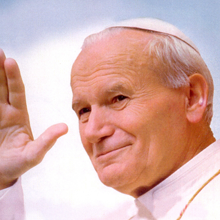 Bringing together these first principles of evangelising communities, we hear St John Paul II affirm, “Faith is born of preaching and every ecclesial community draws its origin and life from the personal response from every believer to that preaching”.[14] It is both the preaching of the kerygma and personal conversion that sustains and grows a missionary culture.
Bringing together these first principles of evangelising communities, we hear St John Paul II affirm, “Faith is born of preaching and every ecclesial community draws its origin and life from the personal response from every believer to that preaching”.[14] It is both the preaching of the kerygma and personal conversion that sustains and grows a missionary culture.
Parishes do not grow when their people do not. The call to spiritual growth challenges ourselves for each of us shapes the Church and its mission by our personal participation in it. The extent to which we grow in faith and holiness will be the extent to which the Church grows in faithfulness and holiness.
As leaders we must realise that everything we do or say teaches people something about the Church. Ecclesial operators or ‘professionals’ can never replace the holiness of saints, managerialism the spirit of charity. As we have learned from painful history, it is entirely possible for parish leaders to ostensibly live a life for Christ without living a life in Christ. Personal conversion calls for change within us as much as others in the community of faith.
3. Discipleship in the Midst of the Church
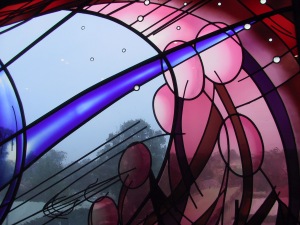 Personal discipleship also calls for the nourishment of an ecclesial community of faith. Evangelising parishes create disciples in the midst of the Church.
Personal discipleship also calls for the nourishment of an ecclesial community of faith. Evangelising parishes create disciples in the midst of the Church.
We know that discipleship is vulnerable without the ongoing, living support from other Catholic disciples. Significantly, a parish sustains personal faith not only through a shared life, mutual witness and spiritual support but by opening individual lives to more possibilities for the life of faith, vocation and holiness than we might otherwise recognise, to a vision that discipleship is possible even in this way.
In the same way as a number of first European settlers arrived in Australia assuming they were, if you like, dragging land and civilisation behind them, we can be tempted to consider our increasing diversity as Australian parishes as something which is being added ‘from the outside’ rather than a theological fact and principle of our life from its earliest beginnings at Pentecost. The challenge and companionship of fellow Christians, diverse in cultural expression of faith and piety, liberates and enables a faith richer and deeper than what we could gain on our own.
How might our parishes better integrate and express difference? Research and experience tells us that at the heart of all evangelising and growing communities are small groups as a vital instrument of ecclesial support and differentiated unity. I am not aware of any growing Christian community that does not have an economy of small groups in place to deepen at the same time its members’ experience of Jesus and the Church as encountered in fellow Christians. The experience of liturgy alone can render it difficult for persons to feel instantly at home or connect with others intimately in the context of faith. Most of us have come to the heart of the Church through a small group of some description, whether this was a youth group, a prayer group, a parent or family group.
The introduction of small groups within our parishes and an accompanying culture of invitation, one that communicates in effect that ‘we are incomplete without you’, will enable people to be brought into and nurtured by a supportive network of disciples.
While speaking intimately with one another about our lived experience and friendship with Jesus can be counter-cultural for many Catholics, I am heartened by the fact that no one knew they needed an iPhone until Steve Jobs invented one. We are similarly challenged to offer our people the small group of discipleship and learning that they never knew they needed, an experience of personal relationship with Jesus and his Gospel in the midst of others.
 While our vision needs to be as large as the Kingdom, our implementation of that vision needs to begin small. With encouragement for us, it is worth noting that when large evangelical and Pentecostal communities are asked what they seek for their future it is to establish smaller, stable communities in the midst of a local neighbourhood, offering a consistency and intimacy of worship and local service in personal connection with the wider community. In other words, what many megachurches are seeking is a parish.
While our vision needs to be as large as the Kingdom, our implementation of that vision needs to begin small. With encouragement for us, it is worth noting that when large evangelical and Pentecostal communities are asked what they seek for their future it is to establish smaller, stable communities in the midst of a local neighbourhood, offering a consistency and intimacy of worship and local service in personal connection with the wider community. In other words, what many megachurches are seeking is a parish.
We have already in our Church the scale of community to foster powerful spiritual relationships with one another, by small groups and other means. It is not a matter of structure but our capacity for interrelationship and mutual trust in faith, our ability to grow together and also our capacity for collegiality.[15]
It may be news to some that a national ecclesial event, a Plenary Council, has been proposed by the bishops of Australia for 2020, a council to embrace not only the faith of the bishops but to take up the faith of the Australian Church, the collective vision, gifts and charisms for our common future. To be collegial is to be receptive of the faith with which Christ has already endowed the Church. As Australian Catholics we ought to place great hope in our collective ability to discern a future and are challenged not only to have faith in God but in our capacity to respond to God as his people.
To anchor this potential for collegiality, shared discernment and decision-making in our parishes, our capacity for co-responsibility for mission begins within the local parish team and the parish pastoral council as the most immediate opportunities for living the theology we profess.
The risk of not attending to the faith of the faithful as expressed in the local parish, as much as a national plenary council, is no less than turning away possibilities, the manifold charisms and vocations of lay men and women, which God continually offers to us. An Australian parish, and an Australian Church for that matter, that is not discerning God’s call cannot hope to grow because it cannot see what God has already given and deeply invites.
4. Missionary Orientation
 Finally, we recognise that the proclamation of the Gospel, the call to personal discipleship and the life of the Christian community are not for their own sake but for the sake of the world. All that has gone before must bear fruit in our connection with others beyond our communities of faith, beyond the boundaries of the parish.
Finally, we recognise that the proclamation of the Gospel, the call to personal discipleship and the life of the Christian community are not for their own sake but for the sake of the world. All that has gone before must bear fruit in our connection with others beyond our communities of faith, beyond the boundaries of the parish.
In his own way I think Pope Francis has reminded us time and again, with a certain cheek, that the parish is not an organised way to avoid the issues of the world. The parish is not a spiritual refuge or a hotel for the spiritually comfortable. Rather it is a hospital or wellspring open to all who bear wounds or thirst, who await a personal answer for their hope on the road of humanity.
A premier ecclesiologist in the English-speaking world, Joseph Komonchak, reminds us:
To enter the Church is not to leave the world, but to be in the world differently, so that the world itself is different because there are individuals and communities living their lives because of, in, and for the sake of Jesus Christ.[16]
To be a community of disciples is not to stand apart from the world or hover above it but to be within the space of the world differently. To be a Catholic parish, to be a community of believers, is not to withdraw into a ghetto of like-minded individuals but to speak, witness and inhabit this world, a world which is very much in our hands, with a perspective and a commitment to a person whom we believe illuminates its depths and heights.
I believe parishes will move to a missionary footing when they believe in their heart of hearts that there is a harvest, that Christ is preparing people for us to reach, and that we have been anointed by our baptism to speak, live and act by God’s Word in our world.
A missionary parish will prepare people for this assignment, preaching and teaching that the Christian life it is not about choosing between Christ and the world, as if they were utterly opposed. Rather, as the twentieth century spiritual master Thomas Merton observes, Christian life is about choosing Christ by choosing the world as it really is in Him.[17] God’s mission calls us to a constant orientation beyond ourselves, so that the world can witness the spirit of Christ in action, can see and come to believe.
Summary
I suggest four lenses by which we might review and renew the evangelising mission of our parishes:
- proclaim the name, teaching, promises, Kingdom, life, death and resurrection of Jesus of Nazareth, the Son of God (the ‘kerygma’)
- call forth a personal response to this Good News
- foster discipleship in the midst of the Church
- and send these disciples into the world in constant missionary outreach
I believe a parish requires all four elements without exemption, so as not to:
- proclaim the Gospel without personal conversion (we can preach the Gospel and be entirely orthodox, proclaim a sound understanding of the faith, but as Pope Benedict XVI be merely ‘proper’ but ultimately loveless, bearing little actual fruit in the lives of our people);
- we can experience personal conversion but minimise or castoff the influence of the Church (an erroneous sense that it would feel more like real worship if it was ‘me’ praying alone, or a sense that the parish community is something I could rather live without; a ‘private’ Christianity withdrawn from the varieties of discipleship that God offers us in others);
- we can develop an ecclesial life and participate in the Church’s public life but without personal conversion and a living relationship with Jesus (merely ‘attending Mass’ out of custom or working within the Church or school without an attachment to the Gospel, working only for Christ but not working with him);
- or we can proclaim the Gospel, foster personal conversion and a commitment to the Church without any implication for the wider world, displaying a forgetfulness of the fact that we are ‘sent’ as missionary disciples by our baptism to share the life of Christ we ourselves have received.
When our communities grow in these foundations, a culture of discipleship and evangelisation begins to thrive.
 Indeed, it can be seen that these foundations encourage and direct our efforts in this Jubilee Year of Mercy, in which the tenderness and compassion of God calls for announcement. An evangelising community proclaims the mercy of God whose face is Jesus Christ, nurtures our people to know themselves as personally forgiven by God and brought into the freedom of a new life, offers the experience of forgiveness and compassion within the life of the Church, sacramentally and in the companionship of fellow Christians; and equips and emboldens the forgiven to ‘go out’ to share mercy with others who too await someone to pour oil on their wounds, who await the Good News given in Jesus Christ, who is the promise and presence of God’s mercy.
Indeed, it can be seen that these foundations encourage and direct our efforts in this Jubilee Year of Mercy, in which the tenderness and compassion of God calls for announcement. An evangelising community proclaims the mercy of God whose face is Jesus Christ, nurtures our people to know themselves as personally forgiven by God and brought into the freedom of a new life, offers the experience of forgiveness and compassion within the life of the Church, sacramentally and in the companionship of fellow Christians; and equips and emboldens the forgiven to ‘go out’ to share mercy with others who too await someone to pour oil on their wounds, who await the Good News given in Jesus Christ, who is the promise and presence of God’s mercy.
Conclusion
 We cannot change that of which we are not aware. We must name and face head on the present challenges for our culture as Australian parishes, parishes that I believe desire to be missionary and in their heart of hearts wish to receive the grace of God who still desires much for our parish life.
We cannot change that of which we are not aware. We must name and face head on the present challenges for our culture as Australian parishes, parishes that I believe desire to be missionary and in their heart of hearts wish to receive the grace of God who still desires much for our parish life.
However, receiving this grace entails movement on our part, a shift from where we stand and a constant reaching out beyond the complacency of routine or a simplistic ‘silver bullet’ mentality that holds only one way, one program or technique as the exclusive key to growth. We are called to cultural change, to change together and personally which is the perennial challenge of mission.
To build a preaching, discipling, gathering and missioning Church calls for a multidimensional approach filled with bold vision, personal faith, mutual support, and the resolve to be our deepest selves in Christ for the sake of the world.
Ultimately, it means responding with hope and trust in what God can do for us, with us and through us, even on a drizzly Wednesday night in the well-worn pews of the parishes we know and love.
References:
[1] Robert Dixon, Stephen Reid and Marilyn Chee, Mass Attendance in Australia: A Critical Moment. A Report Based on the National Count of Attendance, the National Church Life Survey and the Australian Census (Melbourne: ACBC Pastoral Research Office, 2013), 8.
[2] Fr James Mallon, Divine Renovation: Bringing Your Parish from Maintenance to Mission (New London, CT: Twenty-Third Publications, 2014), 53.
[3] Pope Francis, Evangelii Gaudium 33.
[4] Mallon, Divine Renovation, 19-20.
[5] The fatalistic expression “that won’t work” commonly emerges from a perspective that measures new ideas by the life that we currently know.
[6] Pope Francis, Evangelii Gaudium 27.
[7] Pope Francis, Evangelii Gaudium 93-97.
[8] Pope Paul VI, Evangelii Nuntiandi 22.
[9] Pope Francis, Evangelii Gaudium 164.
[10] John Shea, An Experience Named Spirit as cited in Robert A. Ludwig, Reconstructing Catholicism: For a New Generation (Eugene, Oregon: Wipf & Stock, 2000), 61.
[11] NCLS Research, Denominational Church Life Profile: The Catholic Church in Australia. A Report from the 2011 National Church Life Survey (Strathfield: NCLS Research, 2013), 10.
[12] Thomas Merton, New Seeds of Contemplation (London: Burns & Oates, 1961), 43.
[13] A helpful schema of various stages or ‘thresholds’ of discipleship is provided in Sherry Weddell, Forming Intentional Disciples (Huntington, Indiana: Our Sunday Visitor, 2012), 125-184.
[14] Pope Paul VI, Redemptoris Missio 44.
[15] The challenge of collegiality for our Church recalls the remarks of the late Ukranian Catholic Metropolitan Maxim Hermaniuk who dismissed Roman synods as nothing more than “international study days”.
[16] Joseph A. Komonchak, “Identity and Mission in Catholic Universities”, 12. Available at https://jakomonchak.files.wordpress.com/2013/08/hubbard-lecture.pdf. Accessed 25 August 2016.
[17] Thomas Merton, Contemplation in a World of Action (Notre Dame, Indiana: University of Notre Dame Press, 1998), 153.
